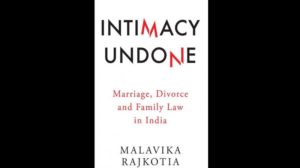Marriage, Divorce and Family Law in India
Malavika Rajkotia
Speaking Tiger
INR 799/
No one likes going through legalities though everyone usually likes to gossip about the scandals behind a divorce. Who did what and why it was done and how much alimony was changing hands. There is no doubt that the law courts are patriarchal and that makes the task of getting a divorce even more of a hurdle for women. However, more and more women are getting divorced and family law is the fastest growing section of civil litigation. This is why family courts have been set up in many places, secluded from the mundane and rather sordid proceedings of the law. Children can play in these places while their parents slug it out.
Malavika Rajkotia is a successful lawyer who tells her experiences with the help of legalese and anecdotes. She has behind her the experience of her uncle who, at 24, married a girl his family had chosen for him. Despite his best efforts, Mohinder Pal Singh was unable to break off the engagement and finally gave in. The marriage lasted a few days at best and the couple separated. In 1975 when Captain Singh finally took his case to a Delhi court, the judge admitted the marriage had broken down irretrievably but refused to grant the divorce because the wife had not committed any wrong.
Rajkotia notes that this doing no wrong philosophy still informs the law courts, a UK legal hangover from the early 20th century. Courtroom battles, therefore, become vicious as both parties attempt to prove guilt or the lack of it, especially when one party opposes the divorce. Children are used as weapons or human shields along with finances. Digging up the dirt on sexual immorality becomes vital when the man is fighting to retain the children – the woman has no such recourse because men have society on their sides.
Despite this gloomy picture, things have changed however – more women are willing to walk out of marriages even though for 30% of those who have no jobs, marriage represents the ultimate security. But this willingness causes the tangle of courtroom battles where women suffer especially if they are the ones trying to break out of the marriage. Judges in many cases are far from generous in awarding alimony even when the man’s family is well-heeled. The result is that issues like what makes a woman good or bad are dragged up and issues like equal parenting and finances suffer. Rajkotia writes that women who make large financial claims are seen as immoral especially in a traditional Indian scenario where women are supposed to be humble, simple and self-sacrificing.
Rajkotia illustrates her theory with anecdotes from her numerous cases. For example, there was chaos when the Delhi High Court got its first woman judge in the shape of Vikram Seth’s mother the late Leila Seth in 1991. Most lawyers found that calling Seth ‘milady’ stuck in their craw and a friend of Rajkotia’s who dared was sharply corrected by the brother judge sitting on the bench with Seth! Rajkotia’s friend of course replied that he was following accepted court procedure. Anecdotes like this make Intimacy Undone entertaining reading while Rajkotia uses historical references to trace the origin of today’s laws to their roots – including the portrayal of women in Indian mythology – something that is vital in a country that seems to be reverting to extreme patriarchy.
Her book is ultimately a plea for more equable divorce– she points out that those women who manage to unshackle themselves in the courts may not want to marry again ever, unwilling to chance the possibility of returning to those bitter battlefields.



